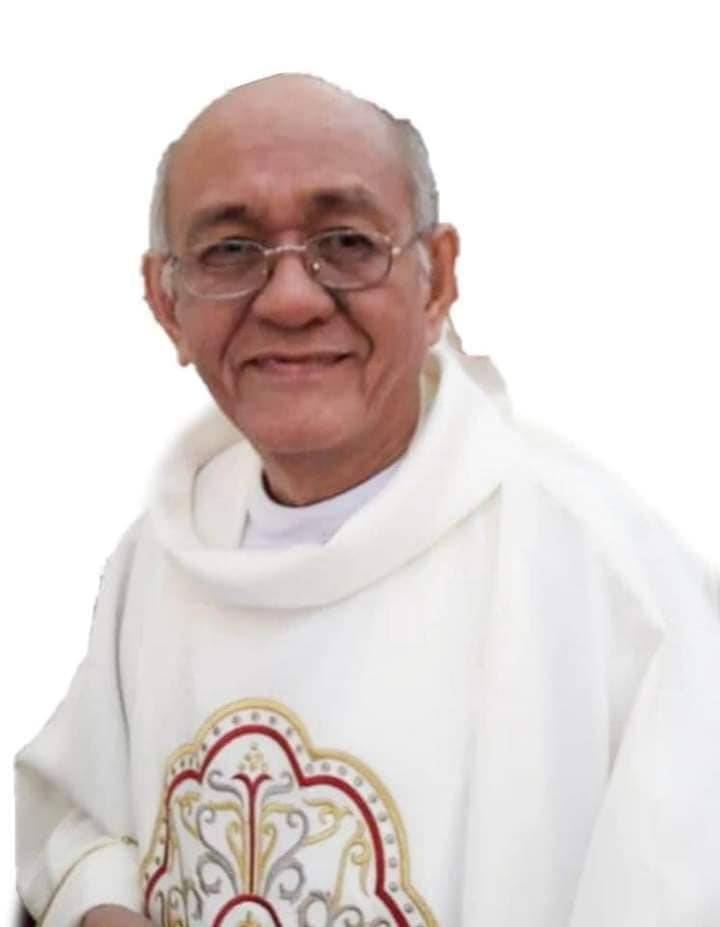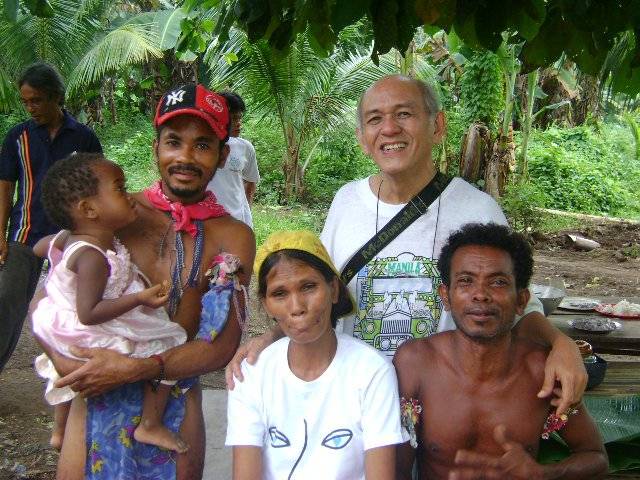Father Pete Montallana: A lover of indigenous peoples, environmental activist

Father Pete Montallana is a lover of poor and indigenous peoples and has been an environmental activist for the last 24 years.
The 72-year-old priest belongs to the Prelature of Infanta, a Catholic territorial prelature located in the municipality of Infanta, Quezon, in the Ecclesiastical province of Lipa in the Philippines. Previously, he was a member of the Order of Friars Minor-Philippine Province.
He is the director of "Bahay Paghubog-Infanta," an indigenous peoples' project to help the Dumagat youth graduate from college. He assists in their formation to own and enhance their Dumagat culture, complete college, and deepen their faith—as Indigenous peoples discover Jesus.
The priest is the ministry/apostolate coordinator of the Indigenous Peoples’ Apostolate (IPA) of the Prelature of Infanta. He also volunteers in the parish ministry in Infanta.
RVA News talked to Father Montallana to find out more about his life, work, and ministry. Excerpts:
Why are you interested in defending the rights of tribal or indigenous people?
I have always been attracted to serving the poor and the indigenous people, particularly the Dumagat tribe, who seem to be the most marginalized among the Filipino tribals.
Approximately 10,000 people live in the Sierra Madre of Northern Quezon and Aurora, specifically in the towns of General Nakar, Polillo Islands, and Aurora: Dingalan, San Luis, Dipaculao, Dinalungan, Casiguran, and Delasag.
What are the challenges you have faced as you fight for their rights?
First of all, it is the greed of the Christian lowlanders who grab the lands of the indigenous people. They are gentle people, whose person-oriented culture considers relationships over and above profit-oriented values.
People who subjugate and tend to exploit indigenous people have no sensitivity towards the poor.
The weakness of the indigenous people, who for years have fallen into the trap of alcoholism introduced by scheming lowlanders to extract property from people ignorant of lowland customs and/or tie them to a relationship where the "slave-owner" decides what they will do every day.
Did you face any threats from others because of your work?
In the beginning, the pseudo Dumagat leaders threatened me to leave because we were empowering them so that they could no longer manipulate them. Aside from that, the military, who had a dossier on me, said that I was "left" supporting the rebel groups on the other side.
I have experienced being threatened by the New People's Army (NPA), the armed wing of the Communist Party of the Philippines, based primarily in the Philippine countryside.
The NPA (rebels) would demand that we give them a copy of our project proposal, which helped the Dumagats to have enough rice.
That was a "tax," that is, to demand a percentage for their cause.
At the time when some NPA connived with a big logger, we continued to teach the indigenous people about their rights to their ancestral lands.
I, together with the parish priest of Dingalan, Aurora, and a sister who worked in the Indigenous Peoples Aposotlste, were threatened that we should no longer go to the hinterlands of the Umiray River, otherwise our bodies would just float on the river.
The same sister was later ordered to lie on her stomach on the floor because she was teaching the Indigenous Peoples Rights Act of 1997 (IPRA Law), which was opposed by the left.
The Indigenous Peoples Rights Act 1997 (Republic Act No. 8371 of 1997) recognizes, protects and promotes the rights of Indigenous cultural communities and Indigenous peoples, creating a National Commission on Indigenous Peoples, establishing implementing mechanisms, appropriating funds therefor, and for other purposes.

What or what is the motivation/inspiration behind your work for and with those tribals?
The presence of the Divine in indigenous peoples' culture has been my deepest discovery, which is also what keeps me going. Of course, the most useful words of Jesus are encounters with him. I have experienced living among the poor as being well-provided for by God.
Who else joins you as you work for them?
Some church-based people are contributing to the cause of the indigenous people and to our struggle to save the Sierra Madre and the environment as a whole. It is true that non-Church-based help them for the sake of humanity's help.
Dumagat is also encouraged to support the cause of the environment. Of course, I am happy that my own family is open to taking care of Dumagat in need, the sick, and our Dumgat students.
Why do you have a passion for caring for the environment?
It is because the future of humanity and all the created realities depend on the environment. It depends on how we take care of the environment today.
According to me, governments should find a sustainable way to replace fossil fuels with wind and solar energy for the good of humanity.
What is its relationship to the environment and tribal peoples?
In a very mysterious way, it has been the tribals who have guarded our forests because of their deep insight that the forest, the mountains, and the whole of creation is their mother.
There is a symbiotic relationship between them and creation. Hence, they almost only get from nature what they need. They then live simply, valuing life or finding happiness in a relationship. In contrast, lowlanders, influenced especially by the Western lifestyle, find happiness in things, gadgets, and how to be better than others.
How do you balance your activism and priestly ministry?
Activism, in your sense—the language of today—is linked to politics and worship. It is the deep realization that Jesus is at work in my life and that the reality that I am a sinner keeps me glued to the only Messiah-not, me. He directs what I have to do in a particular situation. At times, it is full of surprises.
What are your other interests?
I am in the "formation" of the young Dumagat: those with very low self-esteem become articulate.
How does evangelistic poverty influence you and your mission?
Poverty is a gift from God and seems to be a necessary virtue to bring about the universal fraternity. I was inspired by the poverty of Saints Francis and Claire and Pope Francis.
I was taught by the poor, particularly by the urban poor, but especially the Dumagats. What impresses me is their sense of joy in being poor, spontaneously sharing what they have, even to the point of being deprived of their own needs. I was evangelized to live the Gospel, to trust that Makidepet—their name for God—would take care of their needs.
I lived in the squatter area and imbibed how happy the poor have been.
All of these experiences led me to take a "leap into the dark". In answer to the disturbance in my heart, I finally decided when I was a missionary in Sri Lanka to apply for an exclaustration from my vows. I had to undergo deep discernment to be sure if this was God’s will for me. I made a personal retreat; then got a go signal from my community and later from my provincial superior; from the General to the Pope. It was not easy, but I was set free to follow what a colleague termed a "call within a call."
The biggest affirmation I got from living out my full trust in God was when I had a heat stroke inside a Philippine Senate hearing on the Kaliwa Dam. The Save Sierra Madre Network Alliance Incorporated was then defending the land rights of the Dumagat from the intrusion of a government project through the Stop Kaliwa Dam Network, organized by different NGOs and indigenous people in the Quezon and Rizal provinces.
I did not have any savings since whatever I received was shared with the Dumagats living with me in the squatter area. I was operated on in the head, but people pitched in their support. We got more than I needed for that medical procedure.
The bishop even told me that we have some extra funds for the next priest who might need it. I was back in my ministry after a month.
To me, this was a strong sign that gospel poverty can be lived even today despite our sins.
With the growing number of poor people all over the world, Pope Francis has called on the church to be a church of the poor.
Julio Xavier Labayen, a Filipino Discalced Carmelite, served as the Catholic bishop of the Territorial Prelature of Infanta, the Philippines from 1966 until 2003. He led the Prelature to adopt the Church of the Poor as its director in 1979. The whole Philippine Church adopted it in its Second Plenary Council (PCP II) in 1991.
The PCP II was a council that was held in Manila from January 20, 1991, to February 17, 1991. It aimed to change the ways of the Church in the Philippines from the Second Vatican Council.
Radio Veritas Asia (RVA), a media platform of the Catholic Church, aims to share Christ. RVA started in 1969 as a continental Catholic radio station to serve Asian countries in their respective local language, thus earning the tag “the Voice of Asian Christianity.” Responding to the emerging context, RVA embraced media platforms to connect with the global Asian audience via its 21 language websites and various social media platforms.














